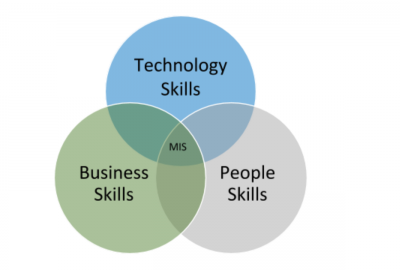Learn more about what you can expect from your online experience at Champlain.
I get asked this question quite often:
"Why would I choose an information systems management degree over another IT-related or business degree?"
It's a great question that deserves some time and attention, because the information systems management career field is not only growing at a fast rate (11% YoY from 2018-2028, with nearly 47,000 jobs being added in the US, according to the Bureau of Labor Statistics). Jobs in this field typically require a bachelor's degree, but they pay well, with a common potential to earn a 6-figure income. It’s a fantastic career field and a degree that will give you access to many incredible career opportunities.
Despite this, many people aren't familiar with the field. If you're curious about information system management, here are some of the most common questions I get about the profession.
What is Information Systems Management?
Information systems management is the study of the relationship among people, technology, and business. While typical IT degree programs are great at teaching IT-specific skills, and business programs are great at teaching business management and functional skills, most do not blend people, technology, and business knowledge into one, valuable program. This is what a degree in management information systems (MIS) does well.
This interdisciplinary skillset - people, technology, and business - is also what makes information systems management professionals so incredibly valuable to organizations. Information systems managers understand how the organization works, how business decisions are made, and the technology systems that enable these decisions to happen. Better yet, they can bridge the communications gaps that are often found between IT departments and organizational leadership.
How MIS Professionals Add Value to an Organization
Everyone uses data, and in the workplace, IT systems capture, process, and disseminate this data. Information systems managers are primarily responsible for the operation, security, integration, and performance of these systems. They work with all levels of the organization from staff to C-level executives, to determine systems-based needs and capabilities, and to analyze associated performance outputs directly related to the business goals that organizations are striving for. IS professionals are enablers - they enable a business idea or goal to happen through effective and efficient IT systems and processes.
Think of how many times you've had a great idea - at work or at home - only to have it hampered in some way by a systems-based issue. Now, imagine that you had that great idea and advanced understanding of the systems needed to make it happen effectively and efficiently. That is what MIS is all about.
It is often said that a business-savvy person with advanced IT skills can write their ticket to any number of high paying, in-demand jobs. The same can be said for the IT-savvy person with knowledge of "how business works." This is what a bachelor's degree in information systems management provides - it gives professionals the people, technology, and organizational skills they need in one valuable, challenging, and complete package.
What Will You Learn From Champlain's Online Information Systems Management Degree?
In Champlain's online management information systems degree program, you will learn people and management skills, advanced technological skills to enable business success, and valuable communication skills. You'll take a variety of courses, including:
- Principles of Business
- Relational Database Design and SQL
- Managing Behavior in Organizations
- Information Systems Analysis and Design
- Project Management
- Enterprise Database Systems
- Information Systems Development
What Makes a Successful Information Systems Professional?
Information systems management is a diverse and quickly growing field. Fortunately, there are common traits associated with high-performing MIS professionals - many of which you may already have. Information systems professionals should have the following skills:
- Problem-solving and thinking from a holistic, systems-based perspective
- Managing resources and time
- Clear and effective communication appropriate to the audience
- Taking responsibility and ownership
- Working collaboratively with others
Why Should You Choose a Career in Information Systems Management?
I tend to like succinct, bulleted lists when I’m trying to convey “big foot stompers.” Here is a list that outlines why you should consider a career in information systems management as clearly as possible:
- Information systems management careers pay well.
- There are incredible placement rates for most jobs in the field.
- You will be in a dynamic, growing, and fast-paced profession.
- You will get to interface with the entire organization – from employees to bosses.
- You will get to not only address pressing problems, but you’ll also be able to provide solutions.
- There are constant opportunities for advancement and upward mobility.
- MIS is a career with true and measurable impact.
Information Systems Careers
With a degree in information systems, you'll be prepared for a wide range of roles in the field. Some common careers for information systems management professionals include:
- IT Manager
- Information Systems Manager
- Business Systems Analyst
- Enterprise Architect
- IT Consultant
- IT Application Developer
- InfoSec Developer
- Business Operations Manager
- Supply Chain Analyst
- Help Desk Advisor
On a personal note, if I had the chance to start my career all over again, knowing what I know now about business trends, the need for certain skillsets in business, and the professional growth and satisfaction associated with the MIS field, I would easily have chosen information systems management as my career path. It really is a fantastic career field that is teeming with opportunity and growth, and needs people just like you to fill the many open positions out there!
You May Also Like
Download Online Experience Guide
Learn more about the online learning experience at Champlain College.

Online Experience Guide Download
I acknowledge that, by clicking the "submit" button, I am giving my express written consent to Champlain College and its representatives to contact me about educational opportunities via email, text, or phone, at the phone number above, including my mobile phone, using an automatic dialer, or pre-recorded message. Message and data rates may apply. I understand that my consent is not a requirement for enrollment, and I may withdraw my consent at any time.







